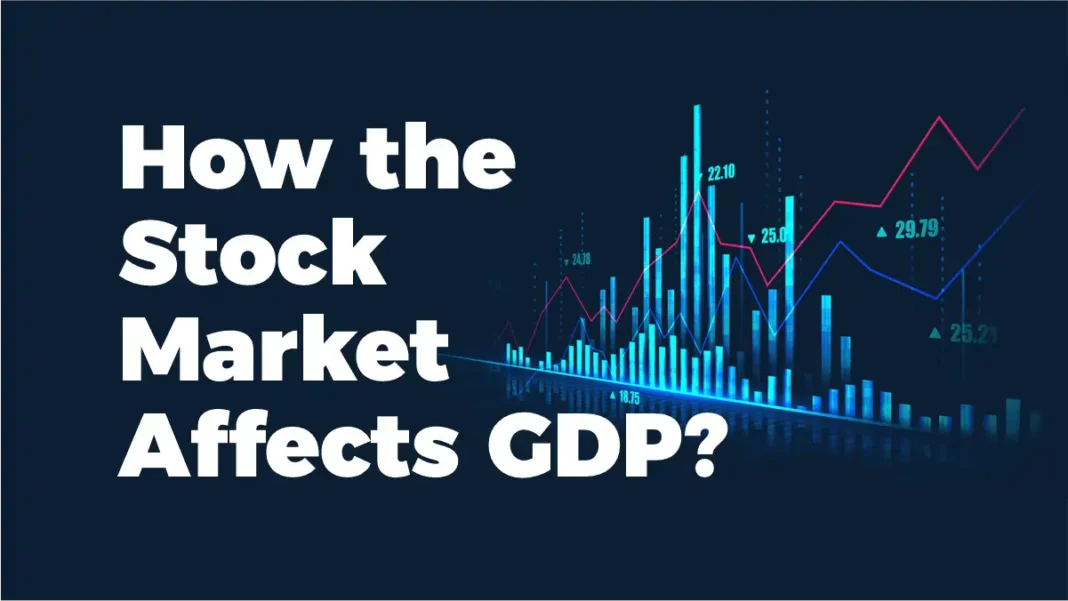The Symbiotic Relationship Between the Stock Market and the Economy
The stock market is often called a “barometer of the economy,” but this simple metaphor doesn’t fully capture the complex, two-way relationship between market performance and a nation’s Gross Domestic Product (GDP). While a soaring market often coincides with a strong economy, the connection is far more nuanced. Understanding how the stock market affects GDP is crucial for investors, policymakers, and anyone looking to grasp the forces that shape our financial lives.
While a rising stock market doesn’t guarantee a strong economy, its influence is undeniable. The market’s movements don’t just reflect economic conditions; they actively contribute to them through several key channels. This article will deconstruct this intricate relationship, exploring how investor confidence, corporate financing, and the “wealth effect” create a feedback loop that can either fuel economic expansion or exacerbate a downturn.
Deconstructing the Connection: Three Key Channels of Influence
The relationship between the stock market and economic growth is not a direct one. Instead, it operates through a series of interconnected mechanisms. To truly understand the relationship between the stock market and GDP, we must analyze these channels.
1. The Wealth Effect: How Stock Prices Impact Consumer Spending
One of the most significant ways the stock market influences GDP is through the wealth effect. When stock prices rise, the value of individuals’ investment portfolios, 401(k)s, and other retirement accounts increases. This boost in perceived wealth makes consumers feel more secure and optimistic about their financial future. As a result, they’re more likely to increase their spending on goods and services, from big-ticket items like cars and homes to discretionary purchases like vacations and dining out.
This increased consumer spending is a primary driver of GDP growth, as it directly contributes to the “Consumption” component of the GDP formula (C+I+G+Nx). The reverse is also true: during a bear market or a significant market crash, investors see their portfolios shrink. This loss of paper wealth can cause a drop in confidence, leading consumers to pull back on spending and save more, which in turn can slow down or even contract economic activity. This phenomenon was on full display during the 2008 financial crisis, where plummeting stock prices contributed to a sharp drop in consumer spending and a deep recession.
2. Corporate Finance and Investment: Fueling Business Growth
The stock market serves as a vital source of capital for corporations, a function that directly impacts the “Investment” component of GDP. When a company issues new shares of stock (a process known as a secondary offering or IPO), it raises capital that can be used for expansion, research and development, hiring new employees, and acquiring other businesses.
A robust and rising stock market makes it easier and cheaper for companies to raise this capital. A high stock valuation means a company can raise a larger amount of money by selling fewer shares, thus avoiding significant dilution of ownership. This access to low-cost capital fuels corporate investment, which is a key ingredient for innovation and job creation. Conversely, in a market downturn, companies find it more difficult to raise capital, which can stifle investment, lead to layoffs, and hinder overall economic progress.
Furthermore, a strong stock market makes it easier for companies to use their stock as a form of currency for mergers and acquisitions. This process can unlock new efficiencies, expand market reach, and create value that contributes to economic output.
3. Investor and Business Confidence: The Psychological Link to Growth
Beyond the tangible effects of wealth and capital, the stock market plays a crucial psychological role as an economic indicator. It’s often seen as a forward-looking measure of economic health. A bull market, characterized by rising stock prices, tends to reflect a general sense of optimism about future corporate earnings and the overall economic outlook. This positive sentiment, in turn, can become a self-fulfilling prophecy.
When investors and business leaders are confident, they are more willing to take risks, invest in new ventures, and expand operations. This increased risk-taking and entrepreneurial spirit can lead to a virtuous cycle of growth. A study by the Macroeconomic Policy Institute (IMK) in 2024 found that the long-run effect of a one-percent change in stock prices on GDP is around 0.2 percent, with the effect materializing over two to three years. The study also noted that this link is more pronounced in more recent periods, particularly after the turn of the millennium, highlighting the growing psychological importance of financial markets. (Fichtner & Joebges, 2024)
The Asymmetric Nature of Market Influence: Bull vs. Bear Markets
It’s important to note that the effect of the stock market on the economy is not always symmetrical. The negative effects of a stock market crash can be more powerful and immediate than the positive effects of a bull market. A sudden, sharp drop in stock values can trigger a cascade of fear and uncertainty. This “panic effect” can cause consumers to immediately halt spending and businesses to freeze hiring and investment plans.
A bull market, while beneficial, tends to build wealth and confidence more slowly and gradually. The psychological boost from a rising market accumulates over time, leading to a more gradual increase in spending and investment. This asymmetry means that while a rising stock market is a boon, a falling one can be a significant headwind to economic stability and growth.
A Deeper Dive: The Interplay with Government and Monetary Policy
The stock market’s impact on monetary policy is a critical, yet often overlooked, part of this equation. Central banks, like the U.S. Federal Reserve, closely monitor stock market performance as an indicator of financial conditions. A rapidly rising market can signal an overheating economy, potentially prompting the central bank to raise interest rates to cool things down and prevent inflation. Conversely, a sharp market decline can signal economic distress, leading the Fed to lower interest rates to stimulate spending and investment.
This dynamic creates a complex feedback loop. The Fed’s actions, in turn, can have a profound effect on the stock market. Lower interest rates make borrowing cheaper for companies and consumers, encouraging investment and spending, which can boost stock prices. A 2024 study on financial market openness in GCC countries highlighted the short-term causal link running from stock market returns to economic growth through various channels, including increased investment and liquidity effects, but also cautioned that excessive volatility can be detrimental. (Almasri et al., 2024)
Beyond the Direct Link: The Stock Market as a Leading Indicator
While the stock market has a direct impact on GDP, its most celebrated role is as a leading economic indicator. This is because stock prices are, in theory, a reflection of a company’s expected future earnings. Investors buy and sell stocks based on their beliefs about how well companies will perform in the coming months and years.
Therefore, a rising market can signal that investors anticipate future economic growth, while a falling market may be forecasting a downturn. This forward-looking nature of the stock market means it can often predict a recession or a period of economic expansion long before a change in GDP is officially reported. For instance, the stock market often bottoms out and begins to recover before the end of a recession, as it anticipates the eventual rebound.
Conclusion: A Barometer with a Feedback Loop
In conclusion, the stock market is far more than a passive reflection of economic health. It is an active participant in shaping it. The connection between the stock market and GDP is a dynamic, multi-faceted relationship driven by three main channels: the wealth effect on consumer spending, the role of corporate finance in business investment, and the powerful psychological impact on overall market confidence.
While there are periods of decoupling, especially in the short term, the long-run link is undeniable. The stock market’s influence on the economy is a crucial consideration for anyone from an individual investor to a central bank policymaker. As RBC Global Asset Management noted in a 2024 analysis, “understanding the dynamics of the stock market’s relationship with the economy can help you digest economic news and stay focused on the long term.” (RBC GAM, 2024).
Ultimately, a healthy stock market is not a prerequisite for a healthy economy, but it is a powerful catalyst that can amplify positive trends and, if left unchecked, accelerate negative ones.
People Also Asked (FAQ)
Q: Does a rising stock market mean a strong economy? A: Not necessarily. While a rising stock market often signals a strong economy, the relationship isn’t perfect. The stock market is a forward-looking indicator, sometimes rising on expectations of future growth that may not fully materialize. However, a sustained bull market can positively influence the economy through increased consumer spending and corporate investment.
Q: What is the connection between the stock exchange and the economy? A: The stock exchange acts as a marketplace where companies can raise capital and investors can buy and sell shares. This connection impacts the economy by providing businesses with funds for growth, creating a “wealth effect” for consumers, and acting as a key barometer of investor confidence, all of which influence GDP.
Q: How do stock prices impact the economy? A: Stock prices affect the economy in several ways, primarily through the wealth effect, which influences consumer spending; by facilitating corporate financing, which drives business investment and job creation; and by serving as a key indicator of economic sentiment, which can influence business and investor decisions.
Q: What is the role of the stock market in economic development? A: The stock market is a fundamental component of a modern financial system that promotes economic development. It mobilizes savings from a wide range of investors and allocates that capital to productive enterprises, thereby fostering innovation, corporate growth, and job creation. This efficient allocation of resources is critical for long-term economic expansion.


